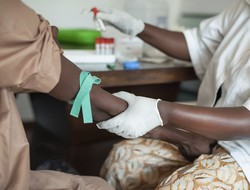Co-infections in HIV-infected individuals in southern Africa
TB is the most common co-infection observed in HIV-positive patients in South Africa, but Hepatitis B and human papillomavirus co-infection are also problematic. In order to decrease overall HIV-related mortality, more research addressing non-TB HIV co-infections is needed. The EU-funded ESAHIVCOINFRES (European and South African HIV co-infection research consortium) project was established to promote HIV co-infection research by training young scientists and establishing research collaborations. Two South African universities and four European partners were involved in the initiative. Researcher exchanges formed a large part of the initiative, ensuring that trainee scientists were exposed to different cultures and laboratory techniques. Nearly 80 peer-reviewed journal articles were produced, and 8 students successfully completed their PhDs. Numerous grants were obtained, including one to fund a clinical trial to prevent immune reconstitution inflammatory syndrome. This syndrome occurs when, during recovery of the immune system, a previous opportunistic infection triggers inflammation. The researchers assessed the role of alcohol use in patients infected with HIV. They found that 25.1 % of the patients were harmful drinkers and 2 % were alcohol dependent. ESAHIVCOINFRES discovered two new fungal infections in southern Africa. They found that both Emmonsia africana and Blastomyces israeliensis have devastating effects in both HIV- and non-HIV-infected patients. Project partners trained early-stage researchers in various aspects of HIV research and built a network of HIV co-infection researchers. From this network, ESAHIVCOINFRES initiated new collaborative research projects by improving research partnerships and networking activities. By improving research partnerships and investigating reasons for mortality despite access to anti-HIV therapies, ESAHIVCOINFRES has helped close an important research gap. These efforts uncovered better ways to care for and treat patients with HIV co-infections.







